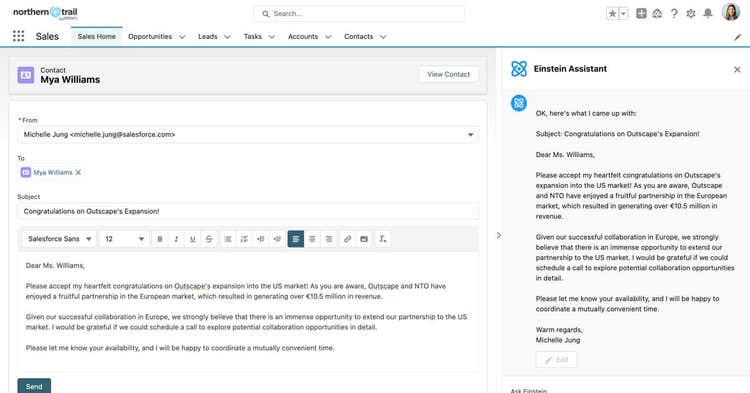Salesforce Enters The Generative AI Race With EinsteinGPT
‘We believe that the value that generative AI can deliver to enterprises is enormous,’ says Clara Shih, Salesforce executive vice president and general manager of Service Cloud.

After teases of a content-generating artificial intelligence offering from Salesforce, the vendor unveiled EinsteinGPT during its TrailblazerDX conference aimed at developers.
Although San Francisco-based CRM vendor Salesforce didn’t give a date for when EinsteinGPT will become generally available, the company showcased a variety of use cases and revealed an integration between its collaboration application Slack and Microsoft-backed OpenAI, the maker of text-generating AI tool ChatGPT and image-generating AI tool Dall-E.
“We believe that the value that generative AI can deliver to enterprises is enormous,” Clara Shih, Salesforce executive vice president and general manager of Service Cloud, said during a press conference Monday. “Seven years ago, we introduced the world to AI purpose-built for CRM. We’re so excited now to be leading the industry again in creating generative AI purpose-built for CRM. … This market is ours to win.”
[RELATED: 8 Partners Weigh In On The ChatGPT, GPT Generative AI Hype]
Salesforce Shows EinsteinGPT AI
Salesforce co-founder and CEO Marc Benioff teased EinsteinGPT in a tweet last month, saying it can generate leads and close deals. Salesforce introduced its regular Einstein AI tool in 2016.
During the company’s latest quarterly earnings call held Wednesday, Benioff said that EinsteinGPT will integrate with all Salesforce cloud offerings plus its Tableau, MuleSoft and Slack subsidiaries.
“It is another way we’re opening the door to use AI for our future and for all of our customers,” Benioff said.
Customers have used Slack as the user interface for generative AI assistants, Benioff said.
“The relevance of Slack as an incredible enterprise productivity platform, user interface and critical data sets for these new AI systems, well, it‘s inspiring all kinds of new use cases,” he said. “I couldn’t be more excited about the future.”
The growth of AI as well as the Internet of Things is an opportunity for other Salesforce products, he said.
“We’ve always been influenced by the world of AI and IoT and seeing our customers try to add in all of their intelligent devices onto our platform so they can have better relationships with their customers who are connected to them in these incredible new ways,” he said.
Along with an upcoming offering of ChatGPT on Slack—notably, Slack competes with Microsoft’s own collaboration app Teams—Salesforce unveiled five products and services around EinsteinGPT at the conference:
*EinsteinGPT for Service
*EinsteinGPT for Sales
*EinsteinGPT for Marketing
*EinsteinGPT for Slack
*EinsteinGPT for Developers
EinsteinGPT for Service aims to help service agents with customer chats and emails with auto-drafted, tailored responses, according to the vendor. Agents can edit the tone, and EinsteinGPT pulls in publicly available data about locations, weather and other information. The goal is to decrease the average handle time.
The service will also turn agent case notes into knowledge articles, which can take on average 10 days to generate.
EinsteinGPT for Sales will try to create natural language summaries for account news and updates, identify key contacts for salespeople and auto-generate drafts for sales emails. Salespeople can also change the formal tone of the content language.
EinsteinGPT for Marketing will try to generate content for tailored landing pages, email campaigns, ads and other efforts based on targeted segments.
The ChatGPT for Slack integration will summarize conversation threads, saving users from having to scroll back weeks and months into a Slack conversation.
EinsteinGPT for Developers will auto-generate code, test cases and comments. The tool can fit the coding style of a company, and it offers auto-complete such as with Google searches.
Salesforce also unveiled a $250 million fund for investing in generative AI startups. During the Salesforce earnings call, Benioff and his team signaled no more acquisitions on the scale of the 2021 $27.7 billion purchase of Slack, with Salesforce now concentrating on growing its margins.
For EinsteinGPT, Shih said that Salesforce is focused on putting guardrails around its generative AI to prevent bias, toxic results and ensure ethics.
Guardrails will also keep customer data secure and private and comply with local data residency requirements, she said.
EinsteinGPT will always have a human—a seller, marketing manager or customer service agent, for example—give the final say and editing capabilities on the content drafts created, she said.